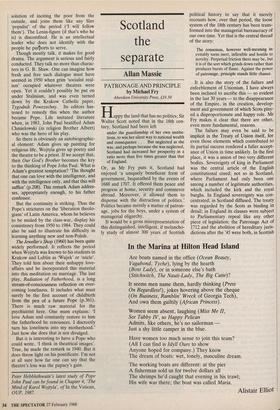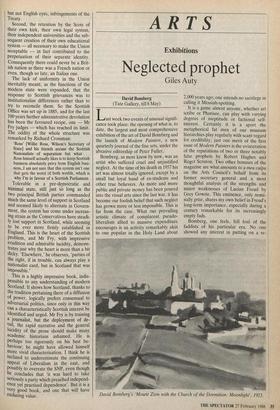Scotland the separate
Allan Massie
PATRONAGE AND PRINCIPLE by Michael Fry
Aberdeen University Press, f19.50
Happy the land that has no politics; Sir Walter Scott noted that in the 18th cen- tury, Scotland had been left
under the guardianship of her own institu- tions, to win her silent way to national wealth and consequence . . . But neglected as she was, and perhaps because she was neglected, Scotland had increased her prosperity in a ratio more than five times greater than that of England.
Or, as Mr Fry puts it, Scotland had enjoyed 'a uniquely beneficent form of government, bequeathed by the events of 1688 and 1707. It offered them peace and progress at home, security and commerce abroad. Moreover, it allowed them to dispense with the distraction of politics.' Politics became merely a matter of patron- age, jobs for the boys, under a system of managerial oligarchy.
It would be a gross misrepresentation of this distinguished, intelligent, if melancho- ly study of almost 300 years of Scottish political history to say that it merely recounts how, over that period, the loose system of the 18th century has been trans- formed into the managerial bureaucracy of our own time. Yet that is the central thread of the story: The consensus, however well-meaning in- evitably turns inert, inflexible and hostile to novelty. Perpetual friction there may be, but it is of the sort which grinds down rather than produces bursts of flame. Against the power of patronage, principle stands little chance.
It is also the story of the failure and enfeeblement of Unionism. I have always been inclined to ascribe this — so evident in the last 30 years — to the disappearance of the Empire, in the creation, develop- ment and government of which Scots play- ed a disproportionate and happy role. Mr Fry makes it clear that there are other, even more fundamental, reasons.
The failure may even be said to be implicit in the Treaty of Union itself, for even those elements which contributed to its partial success rendered a fuller accept- ance of Union in time unlikely. In the first place, it was a union of two very different bodies. Sovereignty of king in Parliament was the central article of the English constitutional creed; not so in Scotland, where Parliament had only been one among a number of legitimate authorities, which included the kirk and the royal burghs. In England sovereignty was con- centrated; in Scotland diffused. The treaty was regarded by the Scots as binding in detail; in England its clauses were subject to Parliamentary repeal like any other piece of legislation: the Patronage Act of 1712 and the abolition of hereditary juris- dictions after the '45 were both, in Scottish but not English eyes, infringements of the Treaty.
Second, the retention by the Scots of their own kirk, their own legal system, their independent universities and the sub- sequent creation of their own educational system — all necessary to make the Union acceptable — in fact contributed to the perpetuation of their separate identity. Consequently there could never be a Brit- ish nation as there was a French nation or even, though so late, an Italian one.
The lack of uniformity in the Union inevitably meant, as the functions of the modern state were expanded, that the response to Scottish grievances was to institutionalise differences rather than to try to reconcile them. So the Scottish Office was set up in 1885, and for the last 100 years further administrative devolution has been the favoured recipe, one — Mr Fry judges — which has reached its limit. The oddity of the whole structure was remarked by Richard Crossman: `Ross' [Willie Ross, Wilson's Secretary of
State] and his friends accuse the Scottish Nationalists of separatism but what . . .
Ross himself actually likes is to keep Scottish business absolutely privy from English busi- ness.. I am not sure that this system isn't one that gets the worst of both worlds, which is
why I'm in favour of a Scottish Parliament.
Tolerable in a pre-democratic and minimal state, still just so long as the two principal British parties commanded much the same level of support in Scotland and seemed likely to alternate in Govern- ment, the system has come under increas- ing strain as the Conservatives have steadi- ly lost support in Scotland, while seeming to be ever more firmly established in England.. This is the heart of the Scottish problem, and Mr Fry, with impressive erudition and admirable lucidity, demons- trates just why the heart is more than a bit dicky. 'Elsewhere,' he observes, 'parties of the right, if in trouble, can always play a nationalist card, but in Scotland that was impossible.'
This is a highly impressive book, indis- pensible to any understanding of modern Scotland. It shows how Scotland, thanks to the tradition pertaining there of a diffusion of power, logically prefers consensual to adversarial politics, since only in this way can a characteristically Scottish interest be identified and urged. Mr Fry is by training a journalist, but the deployment of de- tail, the rapid narrative and the general lucidity of the prose should make many academic historians ashamed. He is perhaps too rigorously on his best be- haviour; he might have allowed himself more vivid characterisation. I think he is inclined to underestimate the continuing appeal of Liberalism in the east, and possibly to overrate the SNP, even though he concludes that 'it was hard to take seriously a party which preached independ- ence yet practised dependence'. But it is a very good book, and one that will have enduring value.



















































 Previous page
Previous page